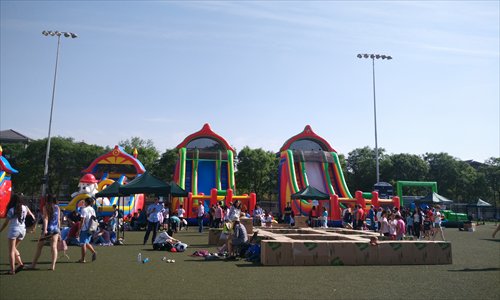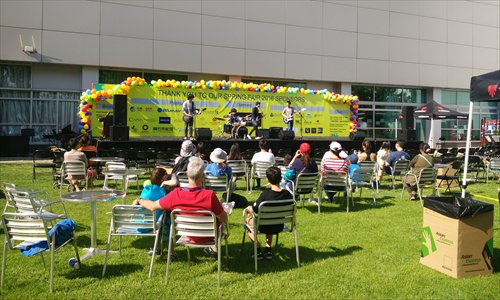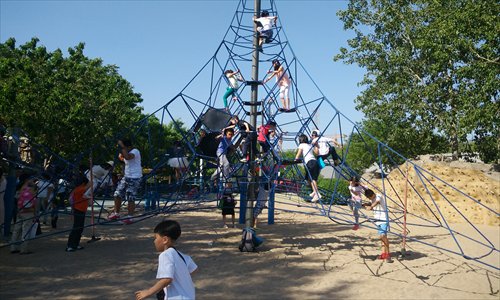Aligning priorities is the first step in navigating the search for the right international school

Children participate in a group lesson at 3e International School in Beijing. Photo: Courtesy of 3e International School
Lise Floris, a 41-year-old Danish mother, felt her mind starting to race when she got the news in late October that she and her family were relocating to Beijing in December, to follow her husband, who works for the European Union delegation in Beijing.
Knowing almost nothing about international schools in Beijing, Floris began to worry about what school was right for her three kids, 11-year-old Rebecca, 14-year-old Samuel, and 16-year-old Simon.
"Beijing is known as a city that has one of the highest concentrations of international schools. The choice is vast and it can be difficult to choose," said Floris.
In November, she visited Beijing for two days to look for schools. Floris visited the Western Academy of Beijing (WAB) under her husband's colleagues' recommendation and a French school. She ultimately chose WAB for its curriculum, student-centered focus, the arts and the parent involvement opportunities.
According to the China international schools development report cited by edu.qq.com in 2015, there were 21 foreign-owned international schools and 64 Chinese international schools in Beijing in 2015. The curriculum ranges from International Baccalaureate (IB, a program that is recognized worldwide for its rigor and innovation) to the English national curriculum, American and Canadian curricula, to the Australian curriculum, and Montessori, or some combination.
Like Floris, parents are faced with a great range of options, and sometimes it can be overwhelming. Not to mention, there are unqualified international schools in the market that parents must be aware of, making it even harder to know the good from bad.

Parents and children in the local community take part in the Spring Fair this May at the International School of Beijing (ISB) in Shunyi district. Photo: Chen Ximeng/GT
The journey of choosing schools
Parents interviewed by Metropolitan all believe that it takes a great deal of research to find the right schools. Clear priorities in curriculum, school programs and parent-school connections, can help them get through the maze.
Floris said that newcomer parents should first think about what is important to them: the curriculum, number of graduates that are accepted at world famous universities, the learning environment, the location, or sports and arts that are offered?
For her family, the learning approach (including curriculum), being multi-cultural and the arts are her major concerns.
Floris remembered that they were interested in a school with an IB program, and a good learning environment.
"The international and multi-cultural aspect of the school is also important," said Floris.
Before making a choice, Floris also visited a French school because her kids were mainly taught in Italian and French back in the European schools. Besides, the tuition fees are affordable for them. Yet, despite the significantly lower tuition fees, they felt that it was not the right choice because it followed the French school system too closely, rather than taking on the role of an international school.
"WAB is more multi-cultural with students representing all the continents," she said.
Since almost all the subjects are taught in English at WAB, at the beginning, her three kids found it challenging with the language barrier. But after six months of attending the school, their English was almost perfect.
"On top of that, we were impressed with the arts the school offered. Our eldest Simon is particularly interested in music and film making," said Floris. Last semester, he took part in many arts activities including performing at the yearly music festival 'Rock in the park.'"
Anja, a 35-year-old Australian mother in Beijing, had her reasons to send her 9-year-old son and 6-year-old daughter to the International Montessori School of Beijing (MSB) several years before.
Anja said she preferred Montessori education because her son is gifted in mathematics and a Montessori classroom caters to this much more than the regular schooling system.
What also attracts Anja is MSB's uniqueness in their close parent community. "Everyone knows everyone and if there is a fund raiser or event, everyone really comes together," said Anja, who is very active as part of the school's parent association.
According to Amy Loveday-Hu, principal of 3e International School, knowing what curriculum a school uses and understanding and agreeing with the approach, are of paramount importance. Not every school or approach is the right fit for every family.
"Compared with other concerns, a school's approach to all-round student well-being is one of the keys to their success," she said.
She suggested when parents visit a school, make it a priority to discuss topics ranging from the school's approach on instruction, family communication, assessment and support, this way you will ensure you are enrolling in a school whose approach meets your needs.
Loveday-Hu also said that no matter how big or small a school is, the focus on human connection and their ability to support the needs of everyone in the community, by working collaboratively and communicating fluidly, is an important factor in decision making that attracts parents.


The volleyball team and the high school drama performance at WAB Photos: Courtesy of WAB
The problems of some 'international' schools
When looking for schools, parents will find that there are two major types of international schools: traditional foreign-owned international schools for foreign students and a new type of Chinese international school mainly aimed at Chinese students. While the market for the former is reaching a plateau, the latter is continuously growing.
Richard Gaskell, director for international schools at the International School Consultancy (ISC) Research, a UK-based data company for the international school market, told Metropolitan that according to their report, there are currently 114 foreign-owned international schools in China with an enrolment of 55,000 students. Yet the demand is down year after year as a result of many Western expat families moving away from the country.
This is confirmed by the results of the 2015 China international schools development report, according to a report from the edu.qq.com in 2015. The report said that after a rapid development between 2000 and 2010, the foreign-owned international school market is saturated. Since 2012, the market entered a stagnate state. Its student pool is downsizing because there are fewer expats in the market due to employers preferring to hire locally, as well as the slowdown of China's economy. Some schools are even lacking applicants.
At the same time, Chinese international schools have been developing significantly.
"What is driving the growth of international schools in China is the emergence of 'international' schools that are accessible to Chinese children. There is an insatiable demand by Chinese for English-medium education, and an enormous number of Chinese families can afford the high fees," said Gaskell.
He said that there are now over 154,000 students, mostly Chinese children, attending Chinese international schools, an increase from 56,500 students in 2011.
Along with the rapid development of Chinese international schools, some problems have arisen.
"There are some very good Chinese international schools that provide enough skilled teachers and leaders to deliver a Western-style learning approach. However, some schools do not provide enough of the right caliber of teachers and leaders to achieve this," said Gaskell.
Eva Sara, director of the foreign teachers department at an international kindergarten, thinks Chinese parents' demand for "international" schools is so great that some schools try to make money by taking advantage of foreign-faced "teachers."
"Some so-called international schools are definitely more affordable, but they do not really have anything 'international' about them apart from foreign teachers popping out now and then, some of whom can not even speak in English fluently," said Sara.
Francis Felicelli, foreign teachers director of Beijing Royal School (BRS), also said in some international schools, they adopt an international curriculum but are still led by native Chinese administers who are resistant to inviting Western educators into leadership positions. Therefore, the international curriculum is often stymied, or limited.
"I have interviewed many foreign teachers and nearly all share this sentiment," said Felicelli.
"It is like if I were to open up a Chinese restaurant in America, I could get the recipes off the Internet, but to truly provide an authentic Chinese cuisine would mean it is necessary to take on a Chinese partner."


Children's activities at The Spring Fair at ISB Photos: Chen Ximeng/GT
Recognizing 'international' schools
Sara thinks parents should watch out for these profit-oriented schools and use comprehensive judgment when choosing a school.
"To try to avoid unqualified international schools, I would suggest parents be aware during the school visit of whether the school has English-speaking staff and how many English-first-language qualified teachers there are, look at the signs around the school, the brochures: Are they in English? Real English?" said Sara.
Ask questions about the curriculum and how it is delivered, try to find out whether the school has a permit to hire foreign employees because having such a permit means that the school can hire foreign teachers directly and not through agencies and therefore the staff should be a little more stable, ask to see an introduction or some certificates of the teachers, talk to them personally, she said.
Elaine Stallard, CEO of London-based Winter's International School Finder, a digital directory of English-speaking schools, also thinks that the sheer variety of schools on offer dictates that prospective expat parents should research carefully and visit schools, rather than making decisions based purely on location or curriculum.
She said if it is not possible to visit schools before turning in an application, international school specific accreditations come into play.
"Parents should also keep an eye out for the accreditations [those received from international organizations, such as Council of International Schools or the Council of British International Schools], as securing them involves a great deal of work and effort and will tell parents a lot about the quality of the school."
Newspaper headline: Making the right choice